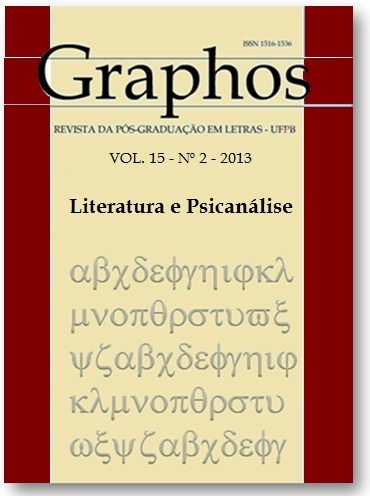Seven: a manipulação do perverso em nome da lei
Keywords:
Literature, Psychoanalysis, Cinema, Perversion, SevenAbstract
This present article provides a discussion of the literary studies of adaptation taking into account the effects of meaning resulting from the literary canon and from the psychoanalysis studies. We observed in the movie Seven, by David Fincher, the possibility of reading the acts of the character John Doe as if they were distinctive of perversion. Our goal is to demonstrate how the actions of the serial killer can reveal unconscious movements which are motivated by the desire seeking to infer, from the crimes committed by the murderer, the unconsciousmovements that reveal the redirection of the desire to objectification of the victims. We observed in our research the intrinsic relationship between the voyeuracts and the sadistic acts motivated by the religious condition that controls the crimes bymeans of the purification of the deadly sins. Therefore, reading the movie Seven as an adaptation based on source-texts that works with the themes sin and transgression of the law, we can observe that the way the movie was build (specially the crimes committed by John Doe) reveals an (re)interpretation of the texts about the deadly sins and about the clinic perversion.
Downloads
References
ALIGHIERI, Dante. Divina Comédia. In.: http://www.stelle.com.br/index.html
ANDREW, Dudley. Adaptation. In.: MAST, Gerald et al (eds.). Film Theory and Criticism. Oxford: Oxford University of Texas Press, 1984.
AQUINO, Santo Tomás de. Sobre o ensino (De magistro) e Os sete pecados capitais. Trad. e estudos introdutórios Luiz Jean Lauand. São Paulo: Martins Fontes, 2000.
CHAUCER, Geoffrey. Os Contos de Cantuária. Apresentação e Trad. Paulo Vizioli. In.: http://www.dle.ufms.br/daniel/literature/Os_Contos_de_Cantuaria.pdf
FREUD, Sigmund. Três ensaios sobre a sexualidade. In.: Obras psicológicas completas de Sigmund Freud. Vol. VII. 2 ed. Rio de Janeiro: Imago, 1989.
GUIMARÃES, Dinara Machado. A voz na luz. Rio de Janeiro: Garamond, 2004.
HUTCHEON, Linda. Uma teoria da adaptação. Trad. André Cechinel. Florianópolis: Ed. da UFSC, 2011.
JULIEN, Philippe. Psicose, perversão, neurose: a leitura de Jacques Lacan. Rio de Janeiro: Companhia de Freud, 2002.
LACAN, Jacques. O Seminário. Livro 5. As formações do inconsciente. Rio de Janeiro: Jorge Zahar Editor, 1999 [1958].
_______. O seminário sobre “A carta roubada”. In.: Escritos. Rio de Janeiro: Jorge Zahar Ed., 1998 [1966].
MILLER, Jacques-Alain. Lacan elucidado: palestras no Brasil. Rio de Janeiro: Jorge Zahar Ed., 1997.
MILTON, John. Paraíso Perdido. São Paulo: Editora Martin Claret, 2006.
SEVEN os sete pecados capitais. Direção: David Fincher. Produção: Arnold Kopelson Phyllis e Carlyle. Intérpretes: Morgan Freeman; Brad Pitt; Gwyneth Paltrow; Kevin Spacey e outros. Roteiro: Andrew Kevin Walker. New Line Cinema, 1995. 1 DVD (127 min), widescreen, color.
STAM, Robert. Teoria e prática da adaptação: da fidelidade à intertextualidade. In: SHÜLER, Arnaldo. Dicionário enciclopédico de teologia. Canoas: Ed. ULBRA, 2002.







